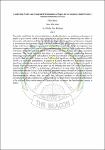Leadership Styles and Academic Performance of Pupils in Government Aided Primary Schools in Kwania District
Abstract
The study established the relationship between leadership styles on academic performance of
pupils in government aided primary schools in Kwania District, determining the effect of
democratic authoritarian and Laissez-faire leadership styles on academic performance of pupils
in government aided primary school in Kwania District. The study employed a cross-sectional
design with mixed approach (quantitative and qualitative methods) in the investigation. Key
information interview was used to collect qualitative data from key District education officials
of Kwania. Data was analyzed inform of descriptive statistics, Peason correlation and robust
regression. The result indicated that there is a positive significant relationship between
Democratic leadership style and academic performance of pupils in Kwania District evidenced
by the P-value (sig=0.00) being less than 0.05 level of significance further contributing 0.488
(48.8%) to academic performance of pupils in Kwania, that there is a moderate positive
significant relationship between authoritarian leadership style and performance of pupils in
Kwania District evidenced by the p-value (sig.=0.00) being less than 0.05 level of significance,
contributing 0.378 (37.8%) to performance of pupils in Kwania while there is a negative
relationship between Laissez-faire leadership and performance of pupil in Kwania evidenced
by the p-value (sig. = 0.214), it contributes -0.069 (-6.9%)to performance of pupils in Kwania.
Recommendations arising from the study are that head teachers of school need to be
encouraged to adopt a combination of leadership styles for an improved academic performance
to be realized. Strict enforcement of District policies to ensure the headteachers remain at
school

